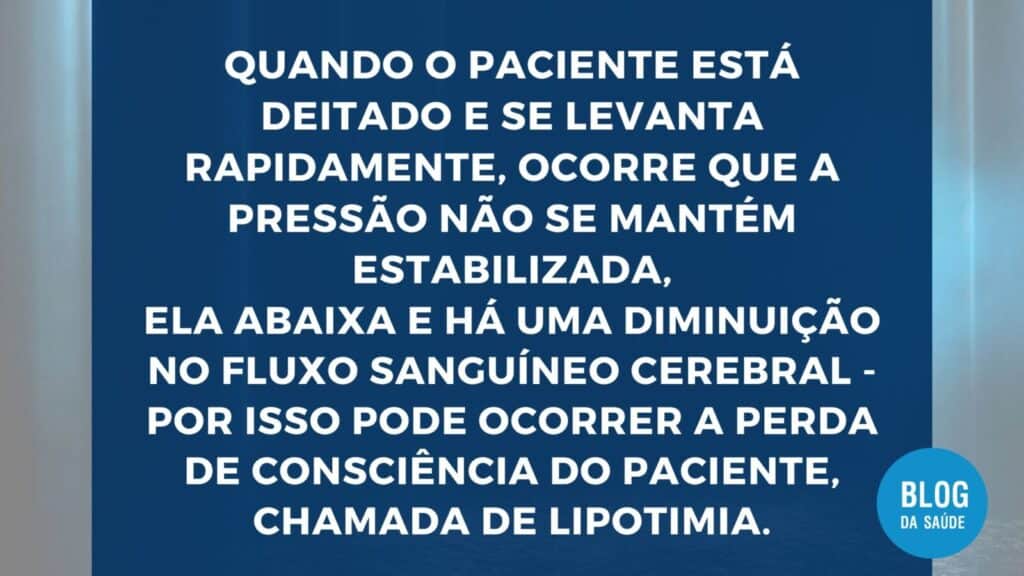
Lipothymia is a condition where the patient loses consciousness. The patient demonstrates a loss of consciousness that can be compared to syncope, which occurs when there is loss of consciousness.
In the case of lipothymia, the patient does not faint, so this condition is considered a sudden change in consciousness that can cause the patient to lose the dimension of place, space and have a momentary loss of memory.
Symptoms of lipotemia
Patients with lipothymia tend to have some symptoms, which are not necessarily mandatory, but are quite common, namely:
causes of lipothymia
Briefly, the causes are:
There are still other patients who have a condition called orthostatic hypotension. A orthostatic hypotension is characterized by a problem in the autonomous nervous system, that is, this system regulates itself and its imbalance can affect situations that we do not voluntarily control, but the autonomous nervous system controls, such as blood pressure, vasoconstriction or vasodilation, skin color, the amount of sweat the body must eliminate for internal temperature regulation.
Patients with orthostatic hypotension have a physiological failure to regulate blood pressure when there is a change in position. As an example, when the patient is lying down – in a horizontal position – and gets up quickly, it happens that the pressure does not remain stabilized, it drops and there is a decrease in the cerebral blood flow – that is why there may be loss of patient’s awareness, called lipothymia.
That is, sudden movements can trigger this situation.

Diagnosis
Understanding the causes is essential to arrive at the ideal clinical conduct. When the patient mentions that he is experiencing these “blackouts”, the doctor takes an anamnesis based not only on the reports, but in which situations this episode tends to happen.
The tests requested usually involve imaging tests, such as magnetic resonance imaging, in order to assess whether there is any neurological alteration, for example.
In addition, in the doctor’s office, the specialist can perform physical examinations, such as asking the patient to lie down and get up so that postural hypotension can be considered or ruled out. Or do other tests so that labyrinthitis – inflammation of an ear structure called the labyrinth – is also a hypothesis.
Generally, a patient with lipothymia recovers after a few minutes of rest without the need for treatment. However, if the patient has several episodes of lipothymia, it may be indicated to undergo tests and investigate the possible causes of the condition so that the treatment can be carried out.
Treatment
It does not occur in all cases that lipothymia is related to a specific pathology. Patients who have suffered trauma, aggression and abuse can present this memory loss and, in these cases, treatments involving therapies can be highly efficient.
In other cases, patients with neurological problems need more rigorous follow-up, as the symptoms can get worse and the treatment can become more delicate.
Some doctors suggest that the patient rest and other doctors suggest that neurological tests be done.
When the patient seeks medical support at an emergency service, the most common clinical approach involves asking the patient to lie down and lift his or her lower limbs, in order to increase blood circulation. The team monitors blood oxygenation and heartbeats and may suggest performing an exam called an electrocardiogram, which will check how the patient’s heartbeats are doing.
In addition to what was mentioned above, patients who go on diets without nutritional monitoring and stay for many hours without eating food can become hypoglycemic, with symptoms of tremors, sweating and even loss of consciousness.
Anemic patients have certain dysfunctions in red blood cells, causing inadequate cell and brain oxygenation.
When the patient is also in a clinical condition of malnutrition and even dehydration, blood pressure problems also occur. Dehydrated patients tend to have lower blood flow, tending to hypotension problems.

When lipothymia causes the patient to fall, the way to intervene is to keep in touch with the patient, talking. Do not move the patient until instructed by health professionals, provide a ventilated environment and give the patient space to breathe fresh air, loosen clothing and belts, if possible, apply a compress of cold water to the back of the patient’s neck.
In general, the treatment will be directed by the doctor in a specific way. Because it is a suggestive situation for many diagnoses, medical support is essential, especially thinking about the prevention of more serious problems – such as a heart attack.
Patients who have suffered trauma, for example, should seek help from a psychiatrist. In addition to therapy, pharmacological treatment with anxiolytics may be suggested, so that the patient does not have anxiety and stress crises – when it comes to trauma.
Some prescribed medications are amitriptyline and sertraline, and you can also combine treatment with sleeping medications, such as clonazepam (Rivotril®).
The conduct is exclusively medical and self-medication can cause irreparable damage to the health of the individual.
Source: blogdasaude.com.br
